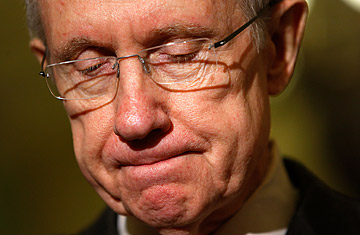
Senate majority leader Harry Reid
(2 of 2)
Getting to 10: Even if they can win all these contests, Republicans would still need to find two more seats in order to gain back the majority. But if the election ends up of becoming a real wave year — as the last two cycles have been for Democrats — it's possible to imagine even the bluest states flipping. Look no further than the upset in Massachusetts last month for evidence as to why Senators from even the most progressive states, such as New York, California, Wisconsin and Washington, are worried. "Republicans still need a few things to break our way, but clearly there is a path forward that was previously unimaginable at the start of this election cycle," says Brian Walsh, a spokesman for the National Republican Senatorial Committee. "There's still a long way to go until November, so we're taking nothing for granted, but particularly after our victory in Massachusetts, there is a lot of energy and enthusiasm, which is putting more states in play and helping with fundraising across the board."
In California, Senator Barbara Boxer is facing one of the toughest re-elections of her career. Polls show her comfortably leading her likely opponent, self-funding millionaire Carly Fiorina, former CEO of Hewlett-Packard. But Boxer's negatives are 10 points higher than they were during her last campaign — a troubling sign that Dems are watching closely.
In New York, Kirsten Gillibrand, a former Congresswoman from upstate New York who was appointed to fill Hillary Clinton's seat, is facing a potential primary challenge from former Tennessee Congressman Harold Ford. But she'll really be in trouble if former New York governor George Pataki, a Republican, decides to run: two hypothetical matchups last month showed Pataki beating Gillibrand by as much as 14 percentage points.
Republicans have yet to find strong challengers for Senators Patty Murray of Washington and Wisconsin's Russ Feingold, though they still have plenty of time. "Clearly, the environment for Democrats continues to deteriorate, which might make recruiting in these states easier," says Duffy of the Cook Political Report. And they'd only need to win two of these four seats in order to get to 10.
GOP incumbents: The Republicans' lift is made heavier by their own vulnerabilities. They have four open seats to defend, which the Cook Political Report rates as toss-ups, including Kentucky, Missouri, New Hampshire and Ohio. Plus, Louisiana's David Vitter is up for his first re-election since his admission that he was a repeat client of the so-called D.C. Madam. And some of the establishment GOP candidates, such as former state attorney general Kelly Ayotte in New Hampshire and Kentucky secretary of state Trey Grayson, face tough primary challenges.
If at first you don't succeed ... The Republicans may well have an uphill battle in regaining control of the Senate. But the mere fact that the Dems are having to defend an increasingly large number of seats means they will be forced to spend more money — money that could otherwise be going to vulnerable House members (and that chamber is looking seriously endangered for Dems). A narrower majority would force Dems to reach out to moderate Republicans to pass legislation. And starting in 2012, the large Democratic freshmen classes of 2006 and '08 start coming up for re-election. "I don't see the majority in jeopardy at this stage, but they're a lot closer than where I thought they'd be this cycle," says Nathan Gonzales, an editor at the Rothenberg Political Report, which also tracks congressional races. "Plus, they start on the defensive in 2012 because of the number of Democratic seats that are in play."
